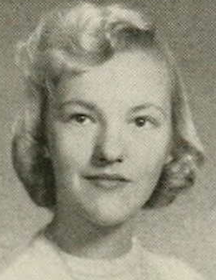Lucy Gwin (January 5, 1943 – October 30, 2014) was an American disability rights activist. She published Mouth, a disability rights magazine.
Early life and education
editGwin was born in Beech Grove, Indiana,[1] the daughter of Robert Willard Gwin[2] and Verna Bodine Gilcher Gwin. Her father worked in advertising and her mother was a teacher who later designed window displays for department stores.[3] She graduated from Thomas Carr Howe Community High School in Indianapolis in 1960.[4]
Career
editGwin ran a restaurant in Rochester, New York and wrote advertising copy as a young woman.[5] She wrote a "strong and vivid"[6] memoir, Going Overboard (1982), about her year spent working on an oil rig ferry in the Gulf of Mexico.[7][8] She was working on another book, tentatively titled The Marriage Conspiracy, and lecturing on the subject of marriage, in the mid-1980s.[9]
Gwin was disabled following a car accident in 1989. The abuses she witnessed in her stay at a rehabilitation facility afterward fueled her concern for the rights of institutionalized people. The facility was eventually closed as a result of her efforts and the investigations that followed. In 1990 she began publishing Mouth, a disability rights magazine.[10][11] "She gave a place for what would be perceived as a radical disability rights voice, and she was fierce in that voice", explained colleague Bruce Darling in a 2021 article. "Everyone was a little scared of her."[7] She worked closely with photographer Tom Olin and writers Josie Byzek and Dave Hingsburger, among others.[10] Mouth ran for 109 issues, before it ceased publication in 2008.[7]
Gwin joined other disability rights activists in protesting the legalization of assisted suicide outside the Supreme Court in 1997, telling a reporter "I'm not going to die for Jack Kevorkian or anybody just because they think I'm not pretty to look at".[12]
Publications
editPersonal life and legacy
editGwin married three times,[9] and had two children.[8] She died in 2014, at the age of 71, at her home in Washington, Pennsylvania.[15] There is a collection of her papers, including a run of Mouth magazine, at the University of Massachusetts.[1] A biography of Gwin, This Brain Had a Mouth by James M. Odato, was published in 2021, with an introduction by Nadina LaSpina.[3][16]
References
edit- ^ a b "Lucy Gwin Papers". UMass Amherst Libraries, Special Collections & University Archives. Retrieved 2023-05-24.
- ^ "Yard Parks to Distribute Free Flower Seeds at Spring Program". The Indianapolis Star. 1954-03-14. p. 21. Retrieved 2023-05-25 – via Newspapers.com.
- ^ a b Odato, James M. (2021). This Brain Had a Mouth: Lucy Gwin and the Voice of Disability Nation. University of Massachusetts Press. doi:10.2307/j.ctv23khmxg. ISBN 978-1-62534-618-6. JSTOR j.ctv23khmxg.
- ^ Thomas Carr Howe Community High School (1960). Hilltopper. (yearbook). p. 117 – via Ancestry.com.
- ^ Frick, Robert (1986-08-29). "Advertising: Agencies call in the creative 'hit squad'". Democrat and Chronicle. p. 40. Retrieved 2023-05-25 – via Newspapers.com.
- ^ "'Middle Age', 'Overboard' new in nonfiction". The Anniston Star. 1982-06-06. p. 52. Retrieved 2023-05-25 – via Newspapers.com.
- ^ a b c Murphy, Justin (December 30, 2021). "Ten feet from a tornado: Rochester disability activist Lucy Gwin remembered in biography". Democrat and Chronicle. Retrieved 2023-05-24.
- ^ a b Snyder, Barbara (1982-02-25). "Today's Woman Has It Made, Author Claims". The Buffalo News. pp. C1, C5. Retrieved 2023-05-25 – via Newspapers.com.
- ^ a b Ashley, Dottie (1985-03-06). "Author wants marriage to be on an equal footing". The State. p. 17. Retrieved 2023-05-25 – via Newspapers.com.
- ^ a b Farrell, Mary Ann (1996-09-15). "Mouth is an angry voice for the disabled". The News and Observer. p. 105. Retrieved 2023-05-25 – via Newspapers.com.
- ^ Hughes, Mona (1998-01-22). "Magazine mouths off to tell disabled readers the truth". The Orlando Sentinel. p. 24. Retrieved 2023-05-25 – via Newspapers.com.
- ^ "Disabled protesters: No duty to die". Asheville Citizen-Times. 1997-01-09. p. 4. Retrieved 2023-05-25 – via Newspapers.com.
- ^ See, Carolyn (1982-07-06). "Book Review: Obnoxious Lucy Joins the Rigrats". The Los Angeles Times. p. 56. Retrieved 2023-05-25 – via Newspapers.com.
- ^ Gwin, Lucy (1997-01-08). "Don't give us death by pity". Corvallis Gazette-Times. p. 7. Retrieved 2023-05-25 – via Newspapers.com.
- ^ Brown, Steven E. "Remembering Lucy Gwin" Disability Visibility Project (November 10, 2014).
- ^ Nash, Indiana (2021-10-30). "Schenectady journalist spotlights disability rights activist Lucy Gwin". The Daily Gazette. Retrieved 2023-05-24.
External links
edit- Video of James M. Odato speaking about "Researching and Writing about the Life of Disability Rights Activist Lucy Gwin" (2022), posted by the New York State Archives on YouTube
- Lucy Gwin reading her 2001 essay "I'm Not With Them", on YouTube
